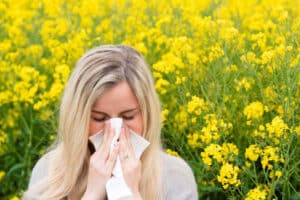May is World Asthma Month, a campaign that aims to raise awareness for people living with asthma..

Silver Surfers reports that in the UK there are over 5.4 million people living with the condition, and though many people associate its worst symptoms with winter, for many, summer can be even more challenging.
Each person has their own unique triggers, and by monitoring them, you can also take steps to avoid them. Here’s some of our best summer asthma tips as recommended by the experts.
Prepare for pollen
Pollen is a common allergy symptom, but can also be an asthma symptom that many are unaware of. According to Lloyds Pharmacy, it’s thought to be a ‘hidden trigger’ for up to 80% of people with asthma. If you’re prone to hay fever, pay close attention to the pollen count in your area to help you stay aware, and if you find the pollen is negatively affecting you, speak to your GP or pharmacist to see if adjusting your medication could make a positive difference.
Consider your travel plans
Think about your summer travel plans and whether your destination is the right choice for you based on your known triggers. Some travellers find their symptoms improve because their exposure to allergens is lower. For example, if pollen is a trigger, a city may provide relief. Or for example, if pollution or dust is problematic, holidays in rural areas can help minimise the chance of an asthma attack. Wherever you go, be sure to pack medication with you. “The best thing people can do to prevent symptoms and attacks when they’re on holiday is to keep on top of their medicine routine. It’s also a good idea for people to get to know their individual asthma triggers and try to avoid these wherever possible,” said Dr Andy Whittamore, in-house GP for Asthma UK.
Keep a good routine
Keeping up with your usual routine of inhaler or medicine is one of the best defences against summer flare-ups when you’re out enjoying exploring or socialising with friends and parties and barbecues. Make a point to keep your inhaler close to hand and stick with any preventative routines you have already in place. By spending some time considering how you might come into contact with your known triggers you can also plan to avoid them or minimise the impact.
Avoid direct sunlight
Your inhaler should be stored in a cool, dry place as much as possible, so avoid leaving it out in direct sunlight or in spaces that can become particularly warm, such as a car glove compartment.
Think about heat
Exercise is a common asthma trigger, and in the heat physical activity can be especially challenging for your body. Don’t push yourself too hard, take regular breaks, and where possible, avoid overheating by cooling off in the shade or indoors out of the direct heat.
Stay hydrated
Drinking plenty of water can help you manage your symptoms in the heat and help you stay cool and calm. While you can’t always control the presence of triggers like pollution, dust and pollen, you can make sure you are comfortable and hydrated wherever you go.
(Article source: Silver Surfers)

